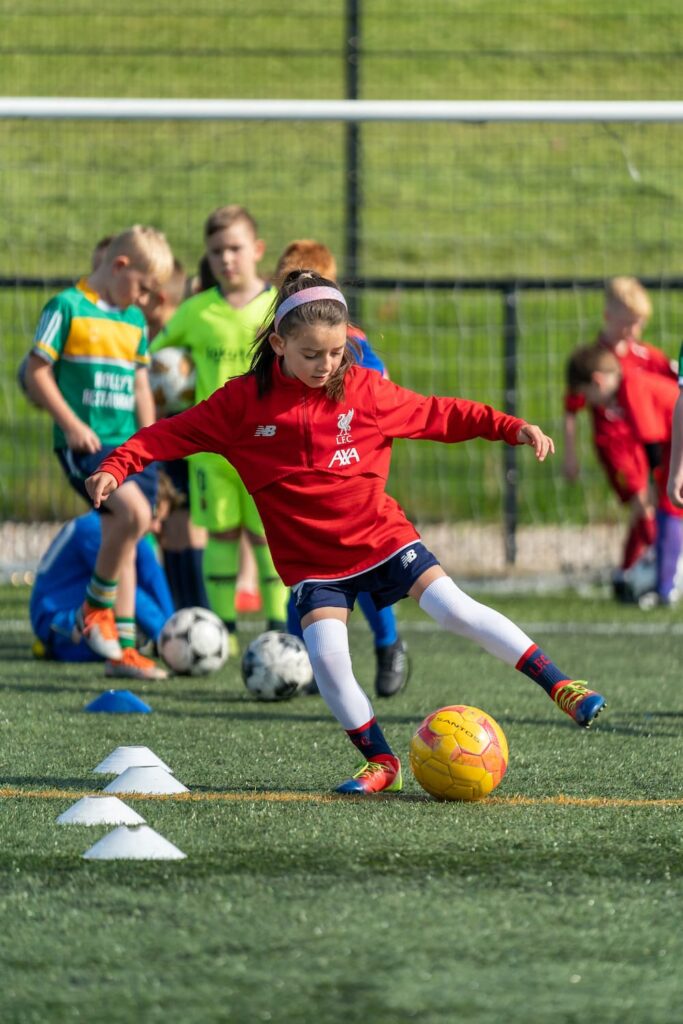Disclosure: Articles may contain affiliate links. As an Amazon Associate, we earn from qualifying purchases (at no additional cost to you). See our full disclosure here.
Last updated on May 31st, 2023 at 04:32 pm
Soccer is a beloved sport worldwide, with millions of children participating in youth soccer leagues yearly. For parents who see their child’s potential in soccer, it’s important to know how to nurture and develop that talent. But, with so many different opinions and strategies, it can be overwhelming to know where to start.

The United States has a history of producing great soccer players, and the popularity of soccer is only increasing with time.
Parents in the US often start their kids in the sport when they’re quite young. A report from Statista says that 7.7% of American children between the ages of six and 12 participate in outdoor soccer. That’s why parents need to be mindful of how to guide their young soccer players reponsibly.
This article will provide some ideas for nurturing your child’s soccer talent, so they can have fun and reach their full potential.

How to Nurture Your Child’s Soccer Talent
1. Encourage Regular Practice
Consistent practice helps build muscle memory, improve technique, and increase stamina. Encourage your child to practice regularly, even if it’s just for a short time each day. Ensure they have access to a soccer ball and a safe place to practice, like a backyard or the local park.
You can incorporate games or challenges into the routine to make practice more fun. For example, set up a mini-goal, and challenge your child to score as many goals as possible in a set amount of time. Or, you can create a series of cones, and challenge your child to dribble around them as quickly as possible. This can help keep your child engaged and motivated to practice regularly.
Remember to praise your child for their efforts and improvements. It will boost their confidence and encourage them to keep at it. With regular practice, your child’s soccer talent will continue to blossom–and improve over time.

2. Follow Soccer Leagues and Participate Locally
By attending games, you can expose your child to different playing styles and strategies, which can help improve their game. Watching live games is also a fun bonding experience for the whole family and can inspire your child to keep practicing and working towards their goals.
In the US, some of the key leagues are the National Women’s Soccer League, Major League Soccer (MLS), the United Soccer League, and the North American Soccer League.
Your child can also participate in local soccer leagues. If you’re looking for a league for your child, just do a quick online search. For example, search “soccer leagues in Costa Mesa,” or whatever city you’re in, and you’ll likely find a fit for your child’s age and ability.
Participating in and attending local games and events can also help your child develop a sense of community and belonging in the sport. They may even have the opportunity to learn from experienced coaches and players, which can further enhance their soccer skills.

3. Have Them Attend Soccer Camps and Clinics
Soccer camps and clinics are designed to provide specialized training and instruction. These programs are run by experienced coaches and players, and will help your child improve their skills and techniques. They also offer a fun environment where your child can socialize with other young soccer players and form new friendships.
Various kinds of soccer camps and clinics are available, ranging from day-long sessions to week-long overnight camps. Some are geared toward specific age groups or skill levels, while others may focus on a particular aspect of the game, such as goalkeeping or dribbling.
It’s a good idea to research the camps in your area to find the best fit for your child’s needs and interests. You can also ask your child’s soccer coach or other parents for recommendations.
Many camps offer early bird discounts, so signing up in advance is a good way to save money–and to make sure your child spot is secured.
4. Watch and Discuss Soccer Games
Watching professional soccer league games together can be a fun bonding experience for the whole family. In addition, it can help your child gain a better understanding of the game and develop critical thinking and analysis skills.
If you’re unable to watch a live match, watching highlights on television is great too. Then, encourage your child to ask questions and share their observations about the game.
5. Pay Attention to Your Child’s Energy Level
While it’s important to nuture your child’s soccer talent by encouraging regular practice and participation in soccer activities, it’s equally important to recognize when your child needs a break. You can do this by paying attention to your child’s energy level.
Overtraining or pushing your child too hard can lead to burnout and even injuries. Signs of burnout may include fatigue, moodiness, decreased interest in soccer, and decreased performance on the field.
Adults and children alike can face burnout due to overtraining or over-exercising, sometimes without realizing it. Therefore, keeping an eye on your child’s mood and energy level is necessary. It can help you identify these signs early on and adjust your routine when needed.

6. Have Reasonable Expectations of Yourself and Your Children
While it’s natural to want your child to excel and succeed in soccer, it’s important to avoid placing undue pressure or unrealistic expectations on them.
Remember that every child develops at their own pace and has unique talents and abilities. Focus on creating a positive and supportive environment for your child to grow and learn, rather than fixating on specific outcomes or goals.
Maintaining a healthy perspective and avoiding becoming overly invested in your child’s soccer success is also important. Remember that soccer is just one aspect of your child’s life and their happiness and well-being should always come first.
7. Communicate with the Team Coach, Manager, or Other Parents
By working with other members of your child’s soccer community, you can stay informed about upcoming events, like training opportunities.
It’s also important to communicate openly and honestly with your child’s coach and other parents about any concerns or questions you may have. You want to ensure that everyone is on the same page and that your child’s needs are being met.
Attending team meetings and events can also be a great way to get to know your child’s coach and other parents on a personal level. This helps build a supportive and inclusive team community, which can positively influence your child’s soccer experience.

Create a Positive and Supportive Environment
Nurturing your child’s soccer talent can be a fun and rewarding experience for you and your child. Following the above tips can help your child develop the skills they need to become a good player while enjoying themselves along the way.
Remember, soccer is not just about winning and losing. It’s about having fun, building friendships, and developing important life skills like teamwork, communication, and perseverance.
By creating a positive and nurturing environment for your child, you can help them develop a lifelong love of sports and develop skills that will serve them on and off the field.
7 Helpful Tips to Nurture Your Child's Soccer Talent | #soccer #parents Click To TweetAlso read:
30 Great Ways to Make Memories With Your Child — Free Printable
29 Old-Fashioned Skills Kids Need to Know (Free Printable)
Gift Guide: 20 Gifts for Soccer Moms
You can find MomsWhoSave on Facebook, Instagram, Pinterest, and Twitter. Join us for updates!
Leave a Reply